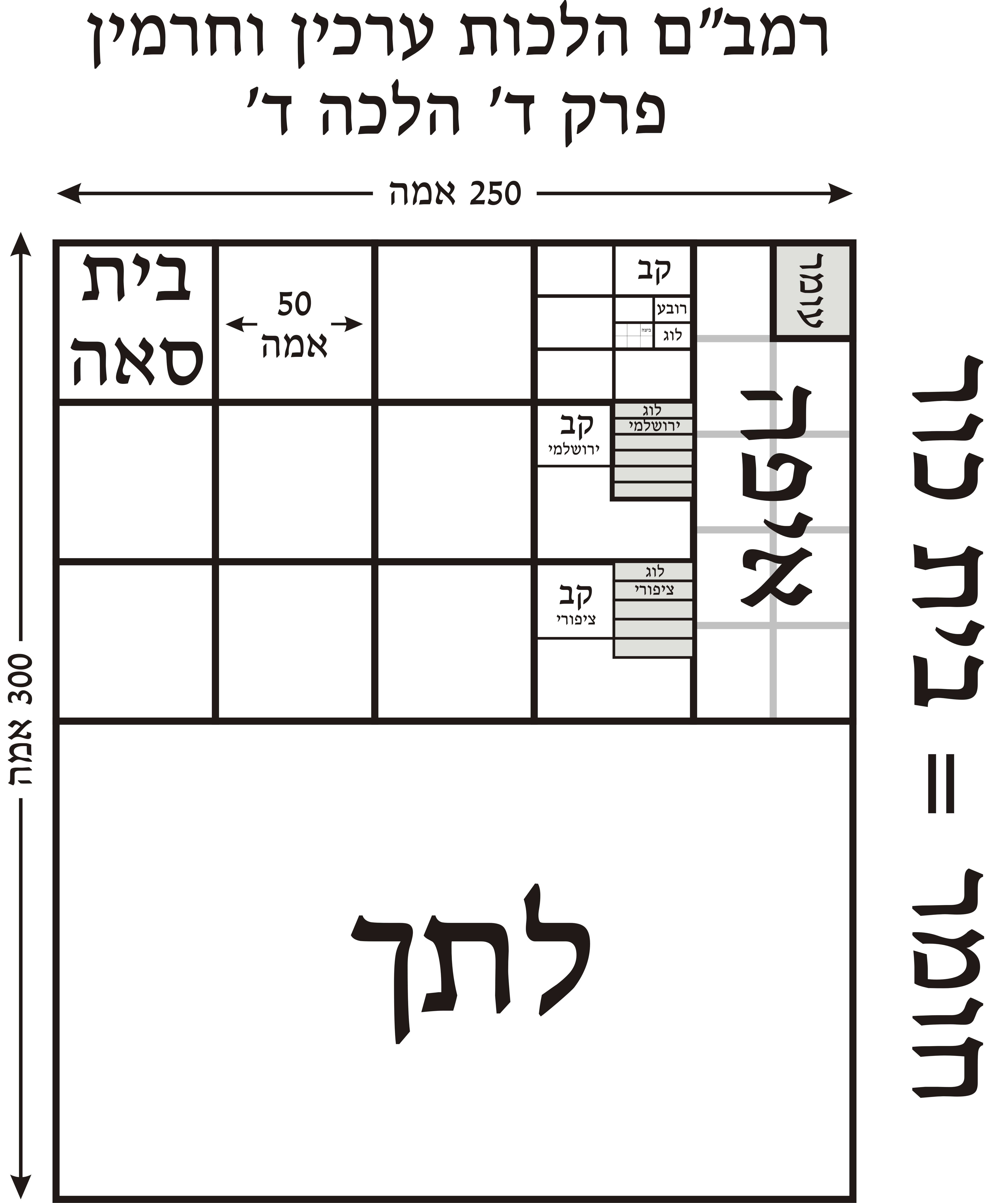חומר and לתך, along with עומר and איפה are Biblical dry measures.
לתך appears only once in תנ”ך in conjunction with חומר, in Hosea 3:2
הושע ג:ב
וָאֶכְּרֶ֣הָ לִּ֔י בַּחֲמִשָּׁ֥ה עָשָׂ֖ר כָּ֑סֶף וְחֹ֥מֶר שְׂעֹרִ֖ים וְלֵ֥תֶךְ שְׂעֹרִֽים:
ואכרה is also an interesting word about which I will post separately.
חמר appears a number of times in this sense. (The root has at least four meanings: donkey, clay or bricks, and a dry measure, and wine, usually in Aramaic, but also twice in Hebrew :
דברים לב:יד
חֶמְאַ֨ת בָּקָ֜ר וַחֲלֵ֣ב צֹ֗אן עִם־חֵ֨לֶב כָּרִ֜ים וְאֵילִ֤ים בְּנֵֽי־בָשָׁן֙ וְעַתּוּדִ֔ים עִם־חֵ֖לֶב כִּלְי֣וֹת חִטָּ֑ה וְדַם־עֵנָ֖ב תִּשְׁתֶּה־חָֽמֶר:
ישעיהו כז:ב
בַּיּ֖וֹם הַה֑וּא כֶּ֥רֶם חֶ֖מֶר עַנּוּ־לָֽהּ:
תהלים עה:ט
כִּ֤י כ֢וֹס בְּֽיַד־יְקֹוָ֡ק וְיַ֤יִן חָמַ֨ר׀ מָ֥לֵא מֶסֶךְ֘ וַיַּגֵּ֪ר מִ֫זֶּ֥ה אַךְ־שְׁ֭מָרֶיהָ יִמְצ֣וּ יִשְׁתּ֑וּ כֹּ֗ל רִשְׁעֵי־אָֽרֶץ:
)
שמות ח:י
וַיִּצְבְּר֥וּ אֹתָ֖ם חֳמָרִ֣ם חֳמָרִ֑ם וַתִּבְאַ֖שׁ הָאָֽרֶץ:
ויקרא כז:טז
וְאִ֣ם׀ מִשְּׂדֵ֣ה אֲחֻזָּת֗וֹ יַקְדִּ֥ישׁ אִישׁ֙ לַֽיקֹוָ֔ק וְהָיָ֥ה עֶרְכְּךָ֖ לְפִ֣י זַרְע֑וֹ זֶ֚רַע חֹ֣מֶר שְׂעֹרִ֔ים בַּחֲמִשִּׁ֖ים שֶׁ֥קֶל כָּֽסֶף:
במדבר יא:לב
וַיָּ֣קָם הָעָ֡ם כָּל־הַיּוֹם֩ הַה֨וּא וְכָל־הַלַּ֜יְלָה וְכֹ֣ל׀ י֣וֹם הַֽמָּחֳרָ֗ת וַיַּֽאַסְפוּ֙ אֶת־הַשְּׂלָ֔ו הַמַּמְעִ֕יט אָסַ֖ף עֲשָׂרָ֣ה חֳמָרִ֑ים וַיִּשְׁטְח֤וּ לָהֶם֙ שָׁט֔וֹחַ סְבִיב֖וֹת הַֽמַּחֲנֶֽה:
ישעיהו ה:י
כִּ֗י עֲשֶׂ֙רֶת֙ צִמְדֵּי־כֶ֔רֶם יַעֲשׂ֖וּ בַּ֣ת אֶחָ֑ת וְזֶ֥רַע חֹ֖מֶר יַעֲשֶׂ֥ה אֵיפָֽה:
יחזקאל מה:יא
הָאֵיפָ֣ה וְהַבַּ֗ת תֹּ֤כֶן אֶחָד֙ יִֽהְיֶ֔ה לָשֵׂ֕את מַעְשַׂ֥ר הַחֹ֖מֶר הַבָּ֑ת וַעֲשִׂירִ֤ת הַחֹ֙מֶר֙ הָֽאֵיפָ֔ה אֶל־הַחֹ֖מֶר יִהְיֶ֥ה מַתְכֻּנְתּֽוֹ:
יחזקאל מה:יג-יד
זֹ֥את הַתְּרוּמָ֖ה אֲשֶׁ֣ר תָּרִ֑ימוּ שִׁשִּׁ֤ית הָֽאֵיפָה֙ מֵחֹ֣מֶר הַֽחִטִּ֔ים וְשִׁשִּׁיתֶם֙ הָֽאֵיפָ֔ה מֵחֹ֖מֶר הַשְּׂעֹרִֽים: וְחֹ֨ק הַשֶּׁ֜מֶן הַבַּ֣ת הַשֶּׁ֗מֶן מַעְשַׂ֤ר הַבַּת֙ מִן־הַכֹּ֔ר עֲשֶׂ֥רֶת הַבַּתִּ֖ים חֹ֑מֶר כִּֽי־עֲשֶׂ֥רֶת הַבַּתִּ֖ים חֹֽמֶר:
הושע ג:ב
וָאֶכְּרֶ֣הָ לִּ֔י בַּחֲמִשָּׁ֥ה עָשָׂ֖ר כָּ֑סֶף וְחֹ֥מֶר שְׂעֹרִ֖ים וְלֵ֥תֶךְ שְׂעֹרִֽים:
חבקוק ג:טו
דָּרַ֥כְתָּ בַיָּ֖ם סוּסֶ֑יךָ חֹ֖מֶר מַ֥יִם רַבִּֽים:
In Mishnaic Hebrew, these dry measurements can also refer to the area of arable land required to produce this quantity of produce (e.g. בית כור is the area that produces one כור).
Based on Maimonides’s definitions of land areas, I created this map:

